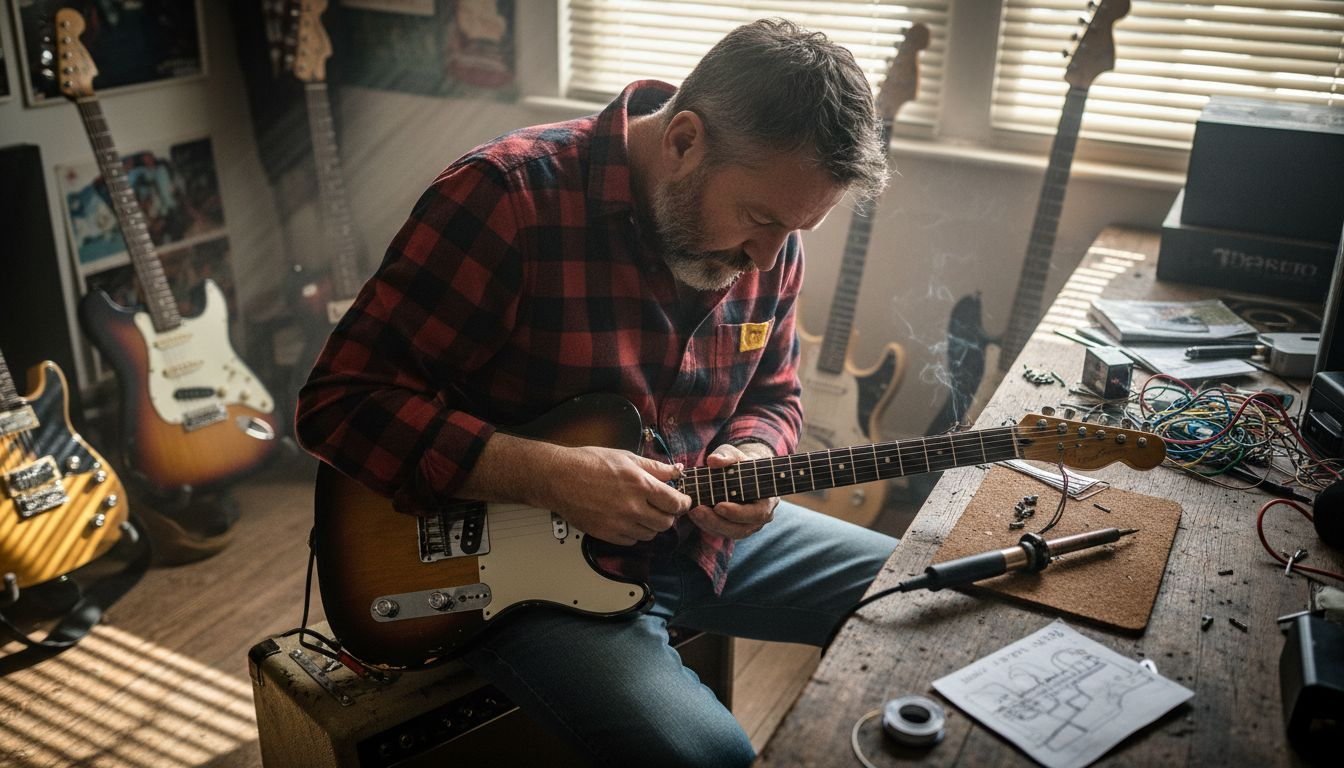When it comes to musical instruments, brand voice is particularly important. People want to know what makes brands unique and why they should choose them over the competition.
First and foremost, cheap guitars often compromise on quality. From poorly constructed bodies to low-quality materials, these instruments may not produce the sound quality and durability that beginners need. Additionally, cheap guitars tend to have tuning stability issues, making it challenging to keep your instrument in tune. This can quickly frustrate beginners and hinder their progress.
Moreover, investing in a quality guitar ensures that you will have an instrument that can grow with you as you advance in your skills. Cheap guitars may not provide the level of playability and tone that more expensive models can offer.
By understanding the hidden costs of cheap guitars, you can make an informed decision when making your purchase. Don't let the allure of a low price tag overshadow the benefits of investing in a quality beginner guitar.
The importance of quality for beginners
When it comes to learning a musical instrument, having a quality instrument is crucial, especially for beginners. A well-made guitar not only produces a better sound but also offers a more enjoyable playing experience. Quality guitars are designed with attention to detail, ensuring that every component works together harmoniously. This results in improved playability, tone, and overall performance.
A quality instrument can inspire beginners to practice more and stay motivated on their musical journey. It provides a solid foundation for learning proper techniques and developing good playing habits. On the other hand, a cheap guitar with poor craftsmanship and subpar materials may hinder progress and discourage beginners from continuing their musical pursuits.
Furthermore, quality guitars are built to last. They can withstand the rigors of regular playing, ensuring that beginners can rely on their instrument for years to come. Cheap guitars, on the other hand, are prone to damage and wear out quickly. This means that beginners may find themselves needing to replace their instrument sooner than they anticipated, resulting in additional expenses in the long run.
Common issues with cheap guitars
Cheap guitars often compromise on quality in various ways. One of the most common issues is poor construction. These instruments may have uneven frets, misaligned necks, or loose hardware. Such flaws can affect the playability and intonation of the guitar, making it difficult for beginners to produce clean and accurate notes. This can be frustrating and hinder their progress.
Another issue with cheap guitars is the use of low-quality materials. The bodies of these guitars are often made from inexpensive woods or laminates, which can negatively impact the tone and resonance. Additionally, cheap guitars may have subpar pickups and electronics, resulting in poor sound quality and limited tonal options.
Tuning stability is another problem commonly found in cheap guitars. The tuning pegs and bridge systems may be of inferior quality, making it challenging to keep the instrument in tune. This can be incredibly frustrating for beginners who are still learning the basics of playing and relying on their guitar to produce the correct pitches.
The impact of poor quality on learning and progress
The quality of a beginner's guitar can significantly impact their learning experience and progress. A poorly made instrument can introduce unnecessary obstacles, making it harder for beginners to develop their skills and musicality.
For example, a guitar with high action (the distance between the strings and the fretboard) can make it physically demanding for beginners to press down the strings and form chords. This can lead to finger fatigue and discourage practicing. On the other hand, a quality guitar with a properly set-up action ensures that beginners can play comfortably and efficiently, allowing them to progress more smoothly.
Furthermore, a guitar with poor intonation (the accuracy of the notes along the fretboard) can confuse beginners and hinder their ability to play in tune. This can lead to frustration and a lack of confidence in their playing. A quality guitar, on the other hand, is designed to have accurate intonation, helping beginners develop their ear and play with better pitch accuracy.
Long-term cost considerations
While cheap guitars may seem like a cost-effective option initially, they can actually end up costing beginners more in the long run. The frequent need for repairs or replacements due to poor quality can quickly add up.
For example, a cheap guitar with tuning stability issues may require constant adjustments or even a replacement of the tuners, which can be an additional expense. Similarly, a guitar with poor intonation may require professional setup or even a complete fret job to fix the issue, resulting in extra costs.
Moreover, as beginners progress in their skills and musical taste, they may find themselves outgrowing their cheap guitar. Upgrading to a higher-quality instrument becomes necessary to meet their evolving needs and aspirations. This means that the money spent on the initial cheap guitar becomes wasted, as it no longer serves its purpose.
Finding the right balance between quality and budget
While it's important to prioritize quality, beginners with limited budgets may wonder if there's a way to find a balance between quality and affordability. The good news is that there are options available that provide a reasonable compromise.
One option is to look for mid-range guitars from reputable brands. These guitars often offer a good balance of quality, playability, and affordability. They may not have all the premium features of high-end models, but they are built with better craftsmanship and materials compared to cheap guitars.
Another option is to consider purchasing a second-hand guitar. Many musicians take good care of their instruments, and buying used can be an excellent way to get a high-quality guitar at a more affordable price. However, it's important to do thorough research, inspect the guitar carefully, and preferably have a knowledgeable person check it out before making a purchase.
Tips for choosing a quality beginner guitar
When it comes to choosing a quality beginner guitar, there are several factors to consider. Here are some tips to help you make an informed decision:
1. Playability: Test the guitar to ensure that it feels comfortable in your hands. Check for smooth fret edges, a properly set-up action, and a neck that is straight and easy to play.
2. Tone: Listen to how the guitar sounds and see if it resonates with you. Different types of wood and pickup configurations can produce varying tones, so consider your musical preferences.
3. Durability: Examine the build quality and materials used. Look for solid construction, high-quality hardware, and a finish that can withstand regular use.
4. Reputable brands: Consider guitars from well-known brands that have a reputation for producing quality instruments. These brands often provide better customer support and have a strong resale value.
5. Reviews and recommendations: Read reviews and seek recommendations from experienced guitarists or music teachers. Their insights can be invaluable in guiding your decision-making process.
Investing in accessories and maintenance
Once you've chosen a quality beginner guitar, it's important to invest in accessories and maintenance to ensure its longevity and optimal performance. Here are some essential items to consider:
1. Guitar case: A sturdy case protects your guitar from damage during transport and storage.
2. Guitar strap: A comfortable strap allows you to play standing up and reduces strain on your shoulders and back.
3. Tuner: A reliable tuner helps you keep your guitar in tune, ensuring that you're always ready to play.
4. Strings: Regularly changing your guitar strings improves the tone and playability. Experiment with different types of strings to find your preferred sound.
5. Cleaning supplies: Keeping your guitar clean and well-maintained enhances its appearance and overall performance. Invest in a guitar cleaning kit and follow proper cleaning procedures.
When it comes to buying a quality beginner guitar, reputable brands offer several advantages. Established brands have a track record of producing reliable instruments, and their customer support is often superior. Additionally, guitars from reputable brands such as Yamaha, Epiphone, and Squier tend to hold their value better if you decide to upgrade or sell in the future.
However, don't overlook the potential of second-hand guitars. Buying used can be a cost-effective way to get a quality instrument, especially if you're knowledgeable or have someone experienced to guide you. Just make sure to thoroughly inspect the guitar, check for any issues, and ensure that it suits your needs and preferences.
Conclusion: Why quality should be a priority for beginners
As a beginner guitarist, choosing a quality instrument is vital for your musical journey. Cheap guitars may seem like an attractive option initially, but the hidden costs associated with them can outweigh the initial savings. A quality guitar not only produces better sound and offers improved playability but also provides a solid foundation for learning and progress.
Investing in a quality beginner guitar ensures that you have an instrument that will last and grow with you as you advance in your skills. It may require a higher upfront cost, but it saves you from the frustrations and expenses associated with cheap guitars in the long run.
So, when you're ready to embark on your guitar-playing journey, remember to prioritize quality. Choose a guitar that inspires you, helps you progress, and brings joy to your musical endeavors. With a quality instrument in your hands, you'll be well on your way to becoming the guitarist you aspire to be. We're more than happy to guide you through the process here at Musicstreet so call in for friendly, helpful advice



Share:
Mastering the Art of Guitar Playing: Tips, Techniques, and Must-Have Guitars
From Good to Great: Transforming Your Sound with These Essential Effects Pedals for a Function Band